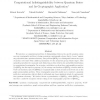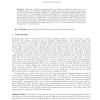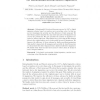242 search results - page 24 / 49 » Randomness in Cryptography |
106
click to vote
EUROCRYPT
2005
Springer
15 years 5 months ago
2005
Springer
We introduce a computational problem of distinguishing between two specific quantum states as a new cryptographic problem to design a quantum cryptographic scheme that is “secu...
EUROCRYPT
2004
Springer
15 years 5 months ago
2004
Springer
Informally, a public-key steganography protocol allows two parties, who have never met or exchanged a secret, to send hidden messages over a public channel so that an adversary can...
112
click to vote
CRYPTO
2003
Springer
15 years 5 months ago
2003
Springer
Abstract. A significant effort has recently been made to rigorously relate the formal treatment of cryptography with the computational one. A first substantial step in this dire...
WAIFI
2007
Springer
15 years 6 months ago
2007
Springer
Kabastianskii, Krouk and Smeets proposed in 1997 a digital signature scheme based on random error-correcting codes. In this paper we investigate the security and the efficiency of ...
CHES
2009
Springer
16 years 11 days ago
2009
Springer
Fault attacks exploit hardware malfunctions to recover secrets from embedded electronic devices. In the late 90's, Boneh, DeMillo and Lipton [6] introduced fault-based attacks...



